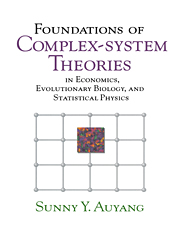Summary
Synthetic Microanalysis of Complex Composite Systems
According to our best experimentally confirmed physical theory, all known stable matter in the universe is made up of three kinds of elementary particle coupled via four kinds of fundamental interaction. The homogeneity and simplicity at the elementary level imply that the infinite diversity and complexity of things we see around us can only be the result of that makeup. Composition is not merely congregation; the constituents of a compound interact and the interaction generates complicated structures. Nor is it mere interaction; it conveys the additional idea of compounds as wholes with their own properties. Composition is as important to our understanding of the universe as the laws of elementary particles, and far more important to our understanding of ourselves, for each of us is a complex composite system and we participate in complex ecological, political, and socioeconomic systems. How does science represent and explain the complexity of composition?
Large-scale composition is especially interesting because it produces high complexity and limitless possibility. Zillions of atoms coalesce into a material that, under certain conditions, transforms from solid to liquid. Millions of people cooperate in a national economy that, under certain conditions, plunges from prosperity into depression. More generally, myriad individuals organize themselves into a dynamic, volatile, and adaptive system that, although responsive to the external environment, evolves mainly according to its intricate internal structure generated by the relations among its constituents.
- Type
- Chapter
- Information
- Foundations of Complex-system TheoriesIn Economics, Evolutionary Biology, and Statistical Physics, pp. 1 - 36Publisher: Cambridge University PressPrint publication year: 1998



